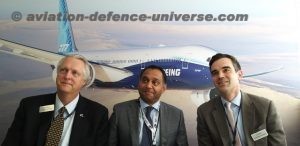Paris. 18 June 2019. Hybrid, safe and practically noiseless: These are the attributes of an innovative small aircraft, dubbed Silent Air Taxi, e.SAT GmbH, a company based in Aachen, Germany, plans to bring to the market. The new air taxi, which is capable of carrying five passengers, was presented to the public for the first time last week. Today, the project has reached the next milestone: On the first day of this year’s International Paris Air Show, e.SAT GmbH and MTU Aero Engines signed a letter of intent (LoI). The parties agreed that Germany’s leading engine manufacturer will take a stake in the development and production of the unique hybrid-electric powertrain for the new aircraft and acquire shares in the recently founded company in the amount of ten million euros.
“The Silent Air Taxi is a very ambitious endeavor and a promising concept for the future. The prospects are good for the project to become a reality,” said MTU’s Chief Operating Officer Lars Wagner. “It perfectly fits into our technology initiative on alternative propulsion systems. This is why we not only contribute our expertise but also take a financial stake in the company.“ Responsibility for the development of the hybrid-electric powerplant rests with e.SAT Powertrain GmbH, a subsidiary of e.SAT GmbH.
“We are highly pleased to have MTU Aero Engines with its one-of-a-kind expertise in the field of aircraft propulsion systems on board,” emphasized Prof. Dr. Peter Jeschke. He and Prof. Dr. Frank Janser are the CEOs of e.SAT GmbH and signed the LoI on behalf of the company. Janser about the goals pursued with the new aircraft:
“Innovative air mobility – as we understand it – must be rigorously aligned with customer requirements. These include shorter travel times, punctuality and flexible response to individual needs.” The company’s CFO, Prof. Dr. Günther Schuh, also signed the LoI and expressed his belief that “this air taxi with its advanced hybrid-electrical powertrain and aerodynamically optimized box wing design will take some of the load off conventional transportation systems in a cost-effective manner and significantly reduce individual travel times.” The Silent Air Taxi is expected to enter service in 2024, two years after its maiden flight.
On MTU’s behalf, the LoI was signed by COO Wagner and Dr. Stefan Weber, Senior Vice President, Technology and Engineering, Advanced Programs. He described the scope of MTU’s contribution: “As an aviation company holding all relevant approvals, we will be involved in the design, development and production as well as certification of the powertrain. In addition, we can bring our expertise in the field of engine control systems to the table.” And, with future perspectives in mind, he added: “This innovative small aircraft might prove a perfectly suitable demonstrator for the development of emerging technology innovations.” Conceivable options include the use of synthetic (electricity- based) fuels and fuel cells to leverage further optimization potentials and pave the way towards emission-free air traffic.
The partners plan to negotiate the details of their cooperation and shareholder relationship by late October, the aim being to get the contract wrapped up before year- end.






























































































































